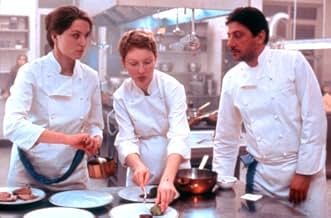NOTE IMDb
7,2/10
8,7 k
MA NOTE
Lorsqu'une chef s'occupe de sa nièce de huit ans, les tensions entre elles montent, jusqu'à l'arrivée d'un sous-chef italien pour détendre l'atmosphère.Lorsqu'une chef s'occupe de sa nièce de huit ans, les tensions entre elles montent, jusqu'à l'arrivée d'un sous-chef italien pour détendre l'atmosphère.Lorsqu'une chef s'occupe de sa nièce de huit ans, les tensions entre elles montent, jusqu'à l'arrivée d'un sous-chef italien pour détendre l'atmosphère.
- Récompenses
- 14 victoires et 7 nominations au total
Wolf-Dietrich Sprenger
- Lauter Gast
- (as W.D. Sprenger)
Victoria Trauttmansdorff
- Begleiterin
- (as Victoria von Trautmannsdorf)
Jerome Ducornau
- Jean
- (as Jerome Ducournau)
Histoire
Le saviez-vous
- AnecdotesSergio Castellitto's German wasn't good enough so Frank Glaubrecht was brought in to dub his voice for the German version.
- GaffesWhen Mario and Lina get ready to cook dinner at Martha's apartment, Lina puts on her apron twice.
- ConnexionsFeatured in Le cinéma passe à table (2005)
- Bandes originalesCountry
Written by Keith Jarrett
Performed by Keith Jarrett, Jan Garbarek, Palle Danielsson, Jørn Christensen
ECM Records
Commentaire à la une
A strange thing about the food: some of it, like the bird-cooked-in-pig's-bladder which Martha describes in loving detail in order to have something to talk about while she's with her therapist, sounds good, and perhaps even looks good, without being in the least bit appetising. You'd have to be mad to actually eat anything that's been cooked in a pig's bladder. But Martha is probably right aesthetically, if not in any other way: if she says the best way to cook the bird is in a pig's bladder, then you'd better believe it.
Martha is a superb creation. She's a good chef. (She may be the best chef of any film ever made.) When her boss sends her to a therapist, she talks about food and cooking, which interest her, rather than about herself, which doesn't interest her. She goes to therapy because her boss orders her to, and when her therapist (who's no fool either) asks her why she thinks her boss orders her to, she says, as though considering the question for the first time, that she doesn't know and she clearly doesn't care, either.
When various people (her orphaned niece, an Italian cook) come along to disrupt her life, we're on her side in wanting her to retain control; and although these likable people DO successfully disrupt her life, she does successfully retain control; so everyone wins. And it's hard not to admire someone who can not only insult the philistines who eat at the restaurant where she works but who know how to do so properly. These people don't know how good they have it. I'd rather be insulted by her than flattered by some spineless flunky.
The script, word for word, and moment for moment, is as perfectly judged as one of Martha's dishes. The IMDb user who says of Lina: "She didn't cry when her mother died, but she was really upset when Martha forgot to pick her up. It wasn't her fault, it was the script's" merely shows how much his sensibilities have been coarsened by Hollywood cliché. In fact, the film shows genuine insight into the way people naturally react, not the way lazy screenwriters would like to train them to react. Lina reacts to her mother's death not with the usual screen histrionics but by not eating. Tears are reserved (as they are in life) for less important misfortunes.
This is an assured, intelligent, charming film. Even the use of music shows an unerring touch. I'm eager to see what Sandra Nettelbeck does next.
Martha is a superb creation. She's a good chef. (She may be the best chef of any film ever made.) When her boss sends her to a therapist, she talks about food and cooking, which interest her, rather than about herself, which doesn't interest her. She goes to therapy because her boss orders her to, and when her therapist (who's no fool either) asks her why she thinks her boss orders her to, she says, as though considering the question for the first time, that she doesn't know and she clearly doesn't care, either.
When various people (her orphaned niece, an Italian cook) come along to disrupt her life, we're on her side in wanting her to retain control; and although these likable people DO successfully disrupt her life, she does successfully retain control; so everyone wins. And it's hard not to admire someone who can not only insult the philistines who eat at the restaurant where she works but who know how to do so properly. These people don't know how good they have it. I'd rather be insulted by her than flattered by some spineless flunky.
The script, word for word, and moment for moment, is as perfectly judged as one of Martha's dishes. The IMDb user who says of Lina: "She didn't cry when her mother died, but she was really upset when Martha forgot to pick her up. It wasn't her fault, it was the script's" merely shows how much his sensibilities have been coarsened by Hollywood cliché. In fact, the film shows genuine insight into the way people naturally react, not the way lazy screenwriters would like to train them to react. Lina reacts to her mother's death not with the usual screen histrionics but by not eating. Tears are reserved (as they are in life) for less important misfortunes.
This is an assured, intelligent, charming film. Even the use of music shows an unerring touch. I'm eager to see what Sandra Nettelbeck does next.
Meilleurs choix
Connectez-vous pour évaluer et suivre la liste de favoris afin de recevoir des recommandations personnalisées
- How long is Mostly Martha?Alimenté par Alexa
Détails
Box-office
- Montant brut aux États-Unis et au Canada
- 4 160 475 $US
- Week-end de sortie aux États-Unis et au Canada
- 40 446 $US
- 18 août 2002
- Montant brut mondial
- 9 852 022 $US
- Durée1 heure 49 minutes
- Couleur
- Mixage
- Rapport de forme
- 1.85 : 1
Contribuer à cette page
Suggérer une modification ou ajouter du contenu manquant

Lacune principale
By what name was Chère Martha (2001) officially released in Canada in English?
Répondre
![Regarder Trailer [OV]](https://m.media-amazon.com/images/M/MV5BYmI4MTFiNjAtNzg5ZC00Mjg2LWFhNDYtMTVhYjYyMTM3ZGM5XkEyXkFqcGdeQXRyYW5zY29kZS13b3JrZmxvdw@@._V1_QL75_UX500_CR0)



























